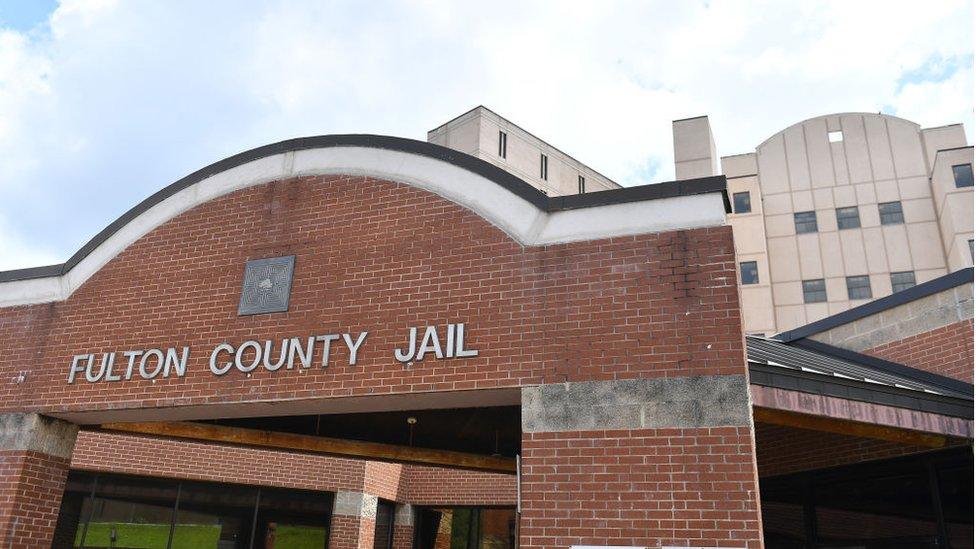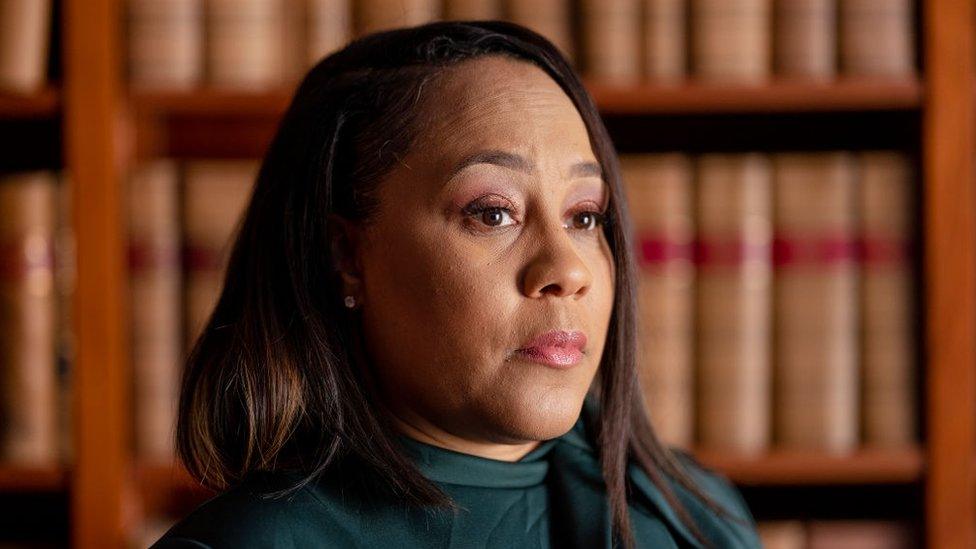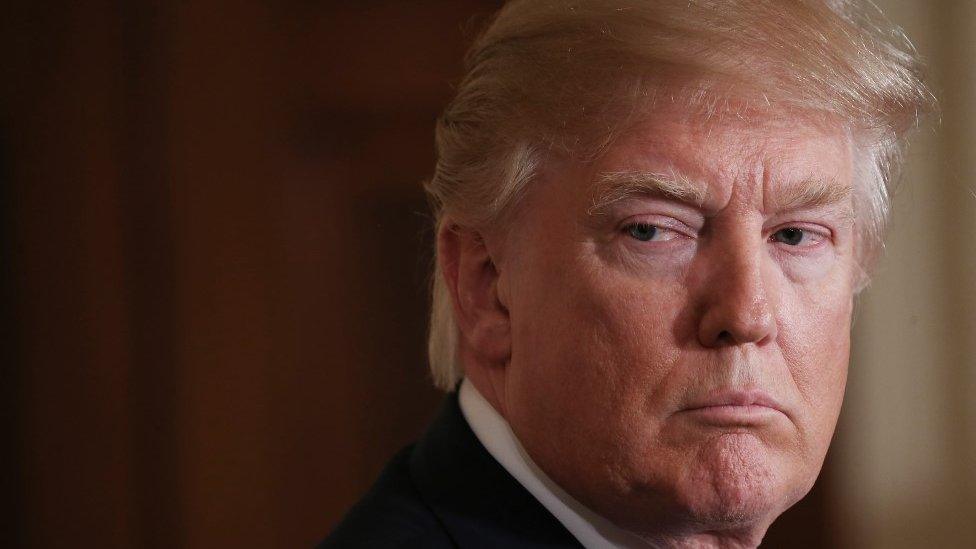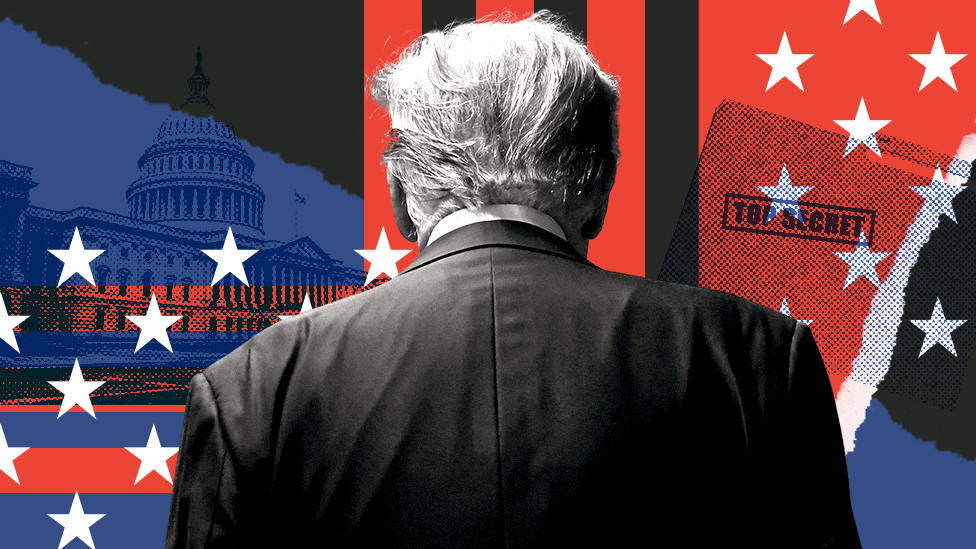Trump's time in Fulton County Jail was brief. Others die waiting
- Published

Fulton County Jail has come under fire for allegations of unsanitary living conditions and negligence
On Thursday, Donald Trump turned himself in to police in Fulton County, Georgia. The process took just minutes - but most other defendants are not so lucky.
Mr Trump said in a fundraising email afterwards that he found conditions at the jail "poor and disgraceful". "It's worse than you could even imagine," he wrote. "It's violent. The building is falling apart."
Yet the former president had a very different experience from those who languish in the county's notoriously unsafe jail for weeks, months or even years while awaiting trial.
In the US, criminal defendants wait in a jail if they have been arrested, are awaiting trial without bail, or are serving a short sentence behind bars. Prisons are where criminals serve longer sentences after conviction.
Hundreds of people were held at Fulton County Jail for more than 90 days because they had yet to be formally charged or could not afford to pay the bail bond required for their release, according to a September 2022 report from the American Civil Liberties Union (ACLU).
The report also found 117 people had waited in jail for more than a year because they had not been indicted; 12 had been held for two years for the same reason.
"It's essentially been overcrowded since it was built," said Fallon McClure, the deputy director of policy and advocacy at the ACLU of Georgia. "This has just been a perpetual cycle over and over for years."
'Rapidly eroding' conditions
Built in 1985 to house around 1,300 inmates, Fulton County Jail has held more than 3,000 people in recent years.
The jail provides "unhygienic living conditions" that have led to outbreaks of Covid-19, lice and scabies, a report by the Southern Center for Human Rights said. It found inmates were "significantly malnourished" and dealing with a condition called cachexia, also known as wasting syndrome.
Waiting in these dilapidated conditions has proven deadly for some.
This month, a 34-year-old man was found unconscious in a medical unit cell at the jail, where he had been held since 2019. He was resuscitated, but then died at the hospital, according to the Fulton County Sheriff's office.
He was the sixth person this year to die in the county jail system in 2023.
Noni Battiste-Kosoko was just 19 when she died in Fulton County Jail custody in July after being arrested on a less serious misdemeanour charge. Deputies found her unresponsive in her cell in the Atlanta City Detention Center, an additional space the county is leasing to alleviate overcrowding at the main jail.
Battiste-Kosoko's family has still not been given a cause for her death or found out the results of her post-mortem examination, her family's lawyer told the BBC.
"There has been a consistent and unsettling pattern of poor healthcare and inmates dying at the jail under mysterious circumstances," said Roderick Edmond.
The Fulton County Sheriff's Office told the BBC it was still awaiting a final report from the autopsy, and that it was investigating the incident.
Battiste-Kosoko's death came just before Fulton County this month agreed to pay $4m (£3.1m) to the family of a man who died in the jail covered in bed bug bites.
An independent autopsy found 35-year-old Lashawn Thompson died in the jail's psychiatric wing last September because of "severe neglect" from jail staff. His death sparked an investigation from the US Department of Justice into conditions at the jail, access to medical care and excessive use of force by officers.
An escalating issue
When it was built in the 1980s, the jail was "state of the art", said Dr Edmond, the attorney. "But it is no longer. That jail needs to be demolished and the citizens of Fulton County need to dig deep and pay the tax dollars to build a brand new jail."
The Fulton County Sheriff's Office itself has acknowledged conditions at the building are "dilapidated and rapidly eroding". It has also called for the construction of a new $1.7bn jail.
"There's been a lot of talk of cleaning it up," said Ms McClure of the ACLU. "We have not really seen or heard anything particularly significant. It seems like a lot of posturing."
Ms McClure said a number of factors have led to overcrowding in the Fulton County Jail system. For one, people charged with misdemeanours in the county are arrested and taken into custody, unlike some other Georgia jurisdictions, where defendants are generally released and given a future court date for minor offences, she said.
The county has also faced a backlog of cases because of the Covid-19 pandemic, and most recently, a slew of indictments under the Racketeer Influenced and Corrupt Organizations (Rico) Act unrelated to the Trump case, she said.
Mr Trump and his co-defendants were charged for violating the same statute. But indictments under the law, passed in the 1970s to help take down organised crime groups like the mafia, are complex and resource intensive, experts say.
"There's the assumption that other cases aren't getting indicted because this is taking up so much time," Ms McClure said.
'Kid gloves'
On Thursday, Mr Trump was fingerprinted and had his mugshot taken. He was given an identification number and details of his charges, his height and weight, and his home city were published on the Fulton County website.
But it's there that the similarities between the former president and the average inmate end.
Mr Trump travelled to and from the jail with a large police escort, and his visit lasted around 20 minutes. Authorities have cited heightened security concerns in making special arrangements.
Watch: Trump surrenders at Georgia jail...in 74 seconds
The contrast in experiences rankled some defence attorneys who have worked in Fulton County for years.
"He's gonna be treated with kid gloves because he's a former president," said Keisha Steed, an Atlanta-area criminal defence attorney who once worked as a public defender.
"And our clients are going to be kicked in the teeth."
- Published15 March 2024

- Published16 August 2023

- Published8 August 2023

- Published28 August 2024
